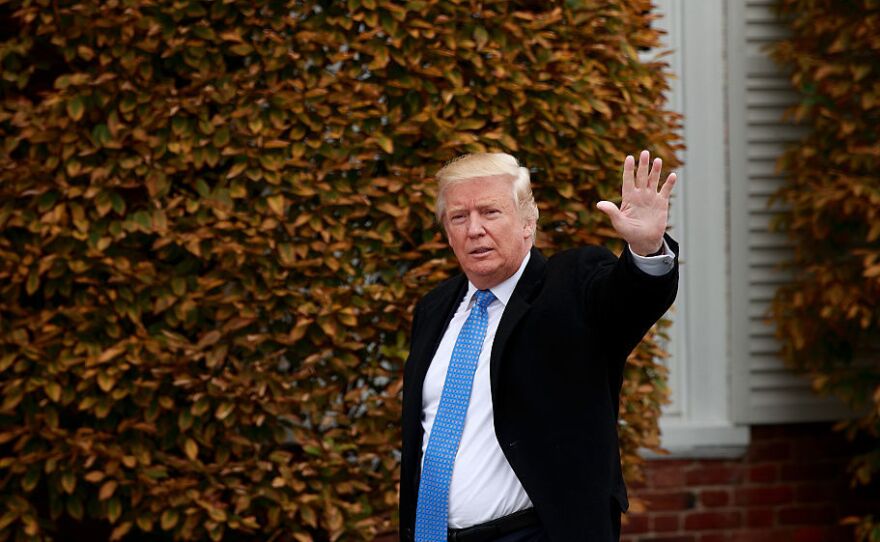President-elect Donald Trump put out a video Monday night that gave an update on the transition process — and laid out some of his "policy plans for the first 100 days."
Much of what Trump proposed wasn't new, from deregulation of the energy industry to a lobbying ban to tearing up the Trans-Pacific Partnership. It closely resembled the 100-day agenda he outlined in a speech he gave in October in Gettysburg, Pa.
A couple of new, but nondetailed items were included, like asking the Defense Department and chairman of the Joint Chiefs of Staff to come up with a plan to combat cyberattacks and to have the Labor Department look into visa-program abuses that "undercut the American worker."
Trump also notably, however, left out some of the most sweeping and controversial promises he had made in that Gettysburg speech — like building a wall along the U.S.-Mexican border (and that Mexico will pay for it), repealing and replacing Obamacare and term limits for members of Congress, a proposal that has already hit a wall (so to speak) with Republican leaders in Congress. (More on what's in and what's not from Trump's 100-day agenda based on the video at the bottom of this post.)
More broadly, though, Trump, who criticized Hillary Clinton during the campaign for not holding a full press conference for some months, hasn't held one of his own since July. No president-elect has gone longer without holding a news conference after being elected dating back to at least Jimmy Carter. (Trump has also still declined to release his tax returns, something that was done by all presidential candidates except Gerald Ford in the past 40 years.)
Since being elected president, Trump has conducted sit-down interviews, with CBS' 60 Minutes and the Wall Street Journal, for example, and reporters from the New York Times were live tweeting their conversation with Trump on Tuesday. But the president-elect has not made himself available to take questions about his policy agenda in a less-controlled, more spontaneous way with the broader press, many of whom are not just national media but local media covering the president in Washington.
All politicians try to avoid the press to some extent. Democrat Hillary Clinton on the campaign trail was fond of talking with local media rather than the national press, for example.
Presidents have long tried to get around the so-called filter of the news media by going directly to the American people using the latest technology, be that radio, television or social media.
President Obama pioneered ways around the media with social media. The Obama White House live-streamed events; the president chatted with YouTube stars; he even posted his prepared remarks for a State of the Union on Medium — before giving the press a look, which had been custom. And Obama did plenty of day-time and late-night talk shows, including slow-jamming the news.
He's also often lectured the news media on its focus on what he sees as "small" subjects. In that way, Trump and Obama share a frustration with the press — and its focus.
But Trump's avoidance of press conferences, in combination with his aggressive — and sometimes personal — criticism of members of the media and its institutions goes further. Obama's White House didn't always like adhering to long-held media customs, but it listened to the press corps' requests and found ways to comply — even if it didn't go as far as the news media would like in all instances.
Aside from a handful of relatively controlled interviews, most of Trump's communication with the public has been through Twitter and Facebook, two platforms on which he has tens of millions of followers. Almost every morning and a few evenings, he has turned to Twitter to boast about his transition process, to air his grievances — with The New York Times, the cast of Hamilton the musical and even the late-night comedy satire Saturday Night Live -- and sometimes a mix of both.
For the most part, since his election, Trump has spent his time focused on the transition at a golf course he owns in New Jersey and at Trump Tower in New York. Aside from waving at cameras over the weekend, and making perfunctory comments about various potential Cabinet members, Trump has been largely out of public view.
Trump has also, however, mixed in some business ties. He "met in the last week in his office at Trump Tower with three Indian business partners who are building a Trump-branded luxury apartment complex south of Mumbai," The New York Times reported. The Trump campaign called it informal and a courtesy call.
Trump also admitted in a meeting with New York Times reporters Tuesday that he asked Nigel Farage, the right-wing, pro-Trump British politician who advocated for Brexit, to oppose wind farms that could impede the view from two of his Scottish golf courses.
"He did not say he hated wind farms as a concept; he just did not like them spoiling the views," Andy Wigmore, a media consultant who was at a meeting with Trump and Farage recently, told the Times.
Trump said Tuesday that "he might have brought it up."
"I might have brought it up," Trump says of Farage meeting and wind farms.
— Maggie Haberman (@maggieNYT) November 22, 2016
Trump's children run his business conglomerate, but also advised his candidacy and figure to play a prominent role in his White House. In an interview Monday on NPR's All Things Considered, Kellyanne Conway — Trump's campaign manager and senior adviser to the transition — dismissed potential conflicts that his children might pose in playing dual roles.
All of it raises more questions of transparency about the president-elect, what kind of president he would be, how he would govern — or if he cares about real or perceived conflicts. Would he seek to use his newfound influence to enrich himself and his family, for example? It's unclear, but possible given his meetings with Indian businessmen and his request of Farage.
Trump told reporters from The New York Times during a meeting Tuesday, "The law's totally on my side; the president can't have a conflict of interest."
Trump on his businesses/conflict q's: "The law's totally on my side, the president can't have a conflict of interest."
— Maggie Haberman (@maggieNYT) November 22, 2016
But that's not quite how conflicts of interest work. And Americans don't appear convinced that he's done enough. A new CNN/ORC poll out Tuesday showed almost 6 in 10 (59 percent) didn't think he was.
Trump's view? He tweeted Monday that it was well known that he had business holdings all over the world and that the media were the only ones making this a "big deal."
Prior to the election it was well known that I have interests in properties all over the world.Only the crooked media makes this a big deal!
— Donald J. Trump (@realDonaldTrump) November 22, 2016
Would Trump speak openly, honestly and frankly to the American people through the American media? At this point, that seems unlikely, based on the contentious relationship he and his campaign have forged so far with the press.
Some advisers, however, Conway in particular, appear to be trying to change that with meetings with heads of media organizations, though Trump himself has seemed intent on settling some scores before any detente.
There's no indication this pattern is likely to change anytime soon. Conway told NPR in an interview on All Things Considered Monday that Trump would hold a news conference "at some point," but that "anytime you try to apply conventional techniques to Donald Trump, you're going to be disappointed."
Trump could answer some of those open questions in a news conference. He would likely face a series of uncomfortable questions about his overseas business entanglements, that business meeting with Indian real-estate developers during the transition — not to mention the $25 million settlement of the fraud lawsuit against Trump University or what exactly his administration has planned with a registry of Muslims.
Jason Miller, Trump's communications director during the campaign, told CNN that "Trump has never advocated for any registry or system that tracks individuals based on their religion." But that a "registry of foreign visitors from countries with high terrorism activity" was in place during the past two administrations.
But rather than have to parse language through advisers and surrogates, the president-elect could clarify for the American people what exactly he is — or is not — proposing.
As far as what is known about Trump's policy, the video gives the first official look directly from the next president. In the video, Trump repeated the slogan of his campaign as he outlined the philosophy that will guide his first 100 days:
"My agenda will be based on a simple core principle: putting America first, whether it's producing steel, building cars or curing disease, I want the next generation of production and innovation to happen right here on our great homeland, America, creating wealth and jobs for American workers."
Trump said he has asked his transition team to develop executive actions he can take on Day 1 and that was the focus of his short video message. Here's what's new from the video, what's the same and what's missing:
What's new?
What's the same?
What's missing?
Much of what Trump had promised in October that wasn't included in his first video message as president-elect would require congressional action, though not all of it. He had previously promised to introduce legislation and work with Congress to get it passed within the first 100 days.
Copyright 2023 NPR. To see more, visit https://www.npr.org. 9(MDAzMjM2NDYzMDEyMzc1Njk5NjAxNzY3OQ001))








